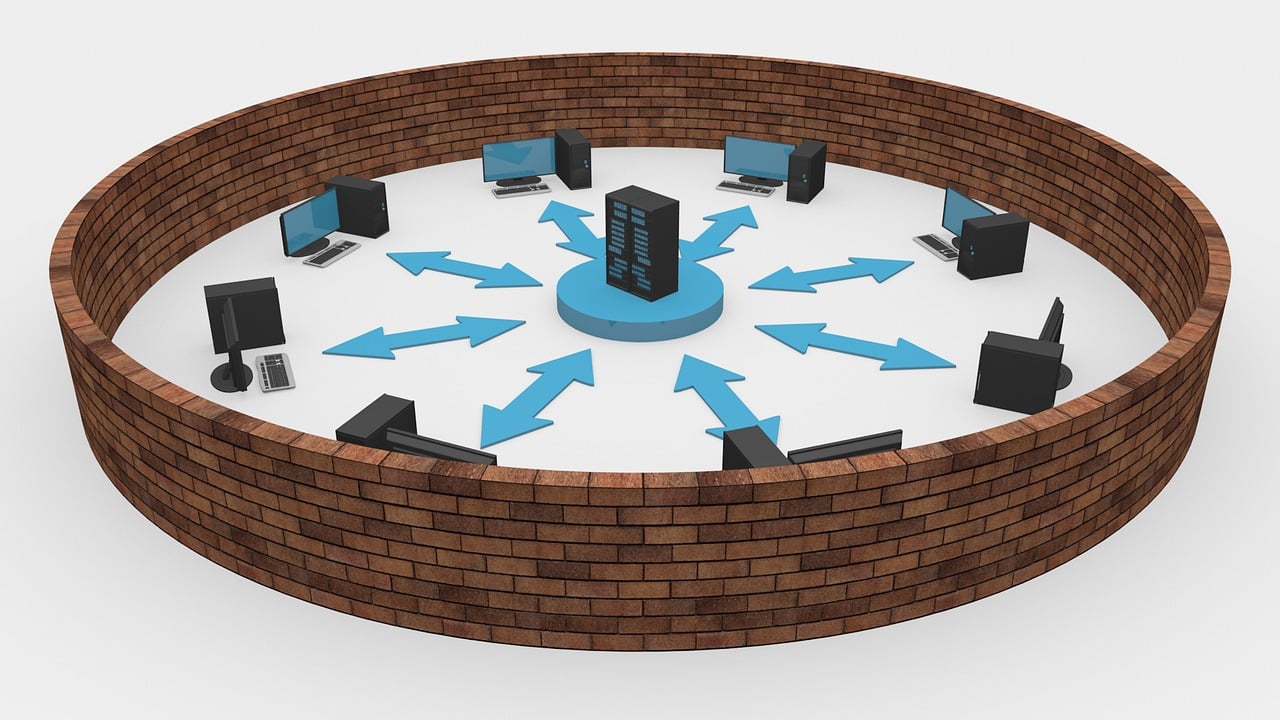This post will show you all you need to know about network firewalls. But before we proceed, let's answer the fundamental question for the novice – what is a network firewall?
Table of Contents
What Is A Network Firewall?
A network firewall is a security system, either hardware-based (a dedicated appliance) or software-based (installed on a device), that monitors and controls incoming and outgoing network traffic.
It acts as a barrier between your private network (e.g., your home Wi-Fi network or a corporate intranet) and the internet's vast, potentially risky world.
Firewalls operate based on pre-defined security policies, essentially a set of rules determining which traffic is allowed and which is blocked.
Imagine a bouncer at a club – they only allow entry to those who meet specific criteria (like age or dress code). Similarly, a firewall only allows network traffic to adhere to established rules.
- Traffic Inspection: Firewalls analyze each data packet (information travelling across the network) based on its source, destination, data type, and other factors.
- Rule Matching: The firewall compares the data packet to its security policies. Suppose the packet aligns with the defined rules (e.g., originating from a trusted source and containing authorized data).
- Blocking Unauthorized Traffic: Any traffic that doesn't comply with the firewall's rules is blocked, preventing unauthorized access and potential threats from entering your network.
Top Network Firewall Deals
Benefits of Network Firewalls
- Enhanced Security: Firewalls act as a first line of defence, filtering out malicious software, viruses, and unauthorized access attempts.
- Improved Network Performance: By blocking unwanted traffic, firewalls can help reduce network congestion and improve overall performance for legitimate traffic.
- Control Over Network Access: Firewalls allow you to define which devices and applications can access the network, providing greater control over your network resources.
Setting up a strong network firewall with clear rules gave me peace of mind knowing my home network was protected from suspicious activity.
Demystifying the Firewall: How It Protects Your Network
Network firewalls play a vital role in safeguarding your network from unwanted access and malicious activity. But how exactly do they achieve this critical function? Let's delve into the inner workings of these digital guardians.
Inspection Station: Analyzing Network Traffic
Imagine a network firewall as a security checkpoint on a bridge. Like vehicles, all data travelling across the network (as data packets) must pass through the firewall. The firewall acts as the inspector, meticulously examining each packet based on various criteria:
- Source: Where did the data packet originate from? Is it coming from a trusted source or an unknown location?
- Destination: Where is the data packet headed? Is it intended for a specific device within your network, or is it trying to access unauthorized resources?
- Port: Ports act like doorways on a device. Different types of traffic use other ports. The firewall checks if the data packet uses a legitimate port for its intended purpose.
- Protocol: This defines the language used for communication between devices. The firewall verifies if the protocol is allowed to pass through.
Matching the Rules: Permit or Block?
The firewall compares each data packet to a pre-defined set of security policies, essentially a list of “allow” and “deny” rules. These rules determine whether a packet is considered legitimate or a potential threat.
- Green Light: The firewall grants access if the data packet aligns with the established rules (e.g., originating from a trusted device within your network and requesting a permitted service). The information can flow freely through the bridge.
- Red Light: The firewall blocks the firewall if the data packet doesn't match the criteria or seems suspicious (e.g., originating from an unknown source or trying to access a restricted port). This prevents unauthorized access and potential threats from entering your network.
Beyond Filtering: Advanced Firewall Features
While basic inspection and filtering are core functions, some firewalls offer additional capabilities:
- Stateful Inspection: These advanced firewalls analyze individual packets and track the ongoing “conversation” between devices. This provides a more comprehensive view of network activity and helps identify suspicious patterns.
- Deep Packet Inspection: This advanced technique goes beyond basic headers and examines the actual content within a data packet. It can be more effective in detecting malware or unauthorized programs masquerading as legitimate traffic.
A Crucial Security Layer, Not a Solo Act
Network firewalls are an essential first line of defence, but it's important to remember they are not foolproof. Firewalls typically don't deal with:
- Encryption: They may be unable to inspect the content of encrypted data packets.
- Zero-Day Attacks: These are new and unknown threats that haven't yet been incorporated into security rules.
Therefore, a layered security approach is recommended. This might include using anti-virus software, updating software, and employing solid passwords alongside your network firewall.
By understanding how firewalls work and using them with other security measures, you can create a more robust and secure environment for your network.
READ ALSO: What is Zero Day Exploit? Risks and Why is it called Zero Day?
Types Of Network Firewalls
Network firewalls, the digital guardians of your network, come in various forms, each with its strengths and functionalities. Understanding these different types can help you choose the right firewall solution.
Here's a breakdown of the most common firewall types:
1. Packet-Filtering Firewalls
- The OG Firewall is the most basic type of firewall, acting as the first line of defence.
- How it Works: They inspect data packets based on pre-defined rules, considering factors like source IP address, destination IP address, port numbers, and protocols.
- Strengths: Simple to configure and manage, offering an essential layer of security.
- Weaknesses: Limited functionality. They can't analyze the content of data packets, making them vulnerable to sophisticated attacks that exploit protocols or manipulate source addresses.
2. Stateful Firewalls
- Taking it a Step Further, These build upon packet filtering firewalls by adding an extra layer of security.
- How it Works: Stateful firewalls inspect data packets and track the ongoing “conversation” (connection) between devices. They analyze the state of the connection and allow or deny traffic based on this context.
- Strengths: Provides a more comprehensive level of security compared to packet-filtering firewalls. They can identify suspicious patterns and prevent unauthorized access attempts more effectively.
- Weaknesses: More complex to configure than packet-filtering firewalls.
3. Proxy Firewalls
- The Intermediary: These firewalls act as a middleman between your device and the internet.
- How it Works: All traffic going in and out of your network first passes through the proxy server, which filters and potentially modifies the data before allowing it to reach your device.
- Strengths: Offers advanced filtering capabilities. Proxy servers can also cache frequently accessed data, potentially improving network performance.
- Weaknesses: This can introduce a performance bottleneck, especially for large data transfers. Additionally, relying on a single access point (the proxy server) can be a security risk if the server becomes compromised.
4. Next-Generation Firewalls (NGFWs)
- The All-in-One Powerhouse: These advanced firewalls combine traditional firewall functionalities with additional security features.
- How it Works: NGFWs offer deep packet inspection, application control, intrusion detection and prevention systems (IDS/IPS), and other advanced features. They can inspect the content of data packets, identify malicious applications, and actively block threats before they reach your network.
- Strengths: Provides the most comprehensive security among all firewall types. NGFWs offer a unified security solution, eliminating the need for multiple security tools.
- Weaknesses: More complex to configure and manage compared to other firewall types. They can also be more expensive than essential firewall solutions.
Choosing the Right Firewall
The best firewall type depends on your specific needs and network environment. Here are some factors to consider:
- Network Size and Complexity: A basic packet-filtering firewall might suffice for small home networks. More extensive or more complex networks might benefit from stateful firewalls or NGFWs.
- Security Requirements: If you require high security for sensitive data, consider a stateful firewall or an NGFW.
- Budget: Basic firewalls are typically more affordable than advanced NGFWs.
By understanding the different types of network firewalls and their functionalities, you can make an informed decision and select the best solution to safeguard your network from ever-evolving threats.
Firewall Form Factors: Hardware vs. Software
Network firewalls, the guardians of your network security, come in two primary forms: hardware and software. Each offers advantages and caters to different needs.
Hardware Firewalls: Dedicated Defenders
- Function: These are standalone physical devices specifically designed for network security. They act as a separate checkpoint for your network's incoming and outgoing traffic.
- Deployment: Hardware firewalls typically connect directly to your network router or switch, filtering traffic before it reaches individual devices.
- Strengths:
- High Performance: Dedicated hardware offers superior processing power, enabling them to handle significant network traffic efficiently.
- Centralized Management: Hardware firewalls can be centrally managed and configured, simplifying security administration for complex networks.
- Advanced Security Features: Many hardware firewalls offer advanced features like deep packet inspection, intrusion detection/prevention systems (IDS/IPS), and VPN capabilities.
- Weaknesses:
- Cost: Hardware firewalls can be more expensive than software firewalls, especially for advanced models.
- Scalability: Scaling a hardware firewall solution might require additional hardware investment as your network grows.
Software Firewalls: Built-in Protectors
- Function: These are software programs installed on individual devices (computers, laptops, smartphones) or operating systems.
- Deployment: Software firewalls monitor and filter traffic directly on their installed device.
- Strengths:
- Convenience: Software firewalls are often pre-installed on operating systems, offering essential protection with minimal configuration.
- Cost-Effective: They are typically free (included with the operating system) or require a relatively low investment compared to hardware firewalls.
- Wide Availability: Software firewalls offer a readily available solution for personal devices.
- Weaknesses:
- Limited Performance: Software firewalls may consume system resources and potentially impact device performance, especially on older machines.
- Decentralized Management: Managing individual software firewalls on multiple devices can be cumbersome.
- Security Features: Typically offer less advanced security features compared to hardware firewalls.
The Modern Landscape: Blurring the Lines
Virtualization technology has blurred the lines between hardware and software firewalls. Some hardware firewalls offer virtualized versions that can be deployed on existing hardware, providing greater flexibility. Conversely, some software firewalls offer advanced features traditionally associated with hardware solutions.
Choosing the Right Form
The best firewall form factor depends on your specific needs. Here's a quick guide:
- For Home Networks: A software firewall built into your operating system might offer sufficient protection for basic needs.
- For Businesses: Hardware firewalls are generally recommended due to their centralized management, scalability, and advanced security features.
- For Enhanced Security: Consider a combination of hardware and software firewalls for a layered security approach.
Remember, choosing the correct firewall form factor is just one aspect of a comprehensive security strategy. It's crucial to update your firewall software and combine it with other security practices like strong passwords and anti-virus software for optimal protection.
READ ALSO: Full Review Of GlassWire Firewall – Extreme Network Monitoring Application
Firewall Fortress Maintenance: Keeping Your Network Secure
A well-maintained network firewall is like a constantly vigilant guard, protecting your network from unwanted access and malicious threats. But like any security system, firewalls require ongoing maintenance to function optimally.
Here are some essential tips to keep your firewall in top shape:
1. Vigilance is Key: Regular Configuration Reviews
- Schedule regular checkups: Don't treat your firewall like a “set it and forget it” system. Set aside time to review your firewall configuration periodically. This could be weekly or monthly, depending on your network activity and the sensitivity of your data.
- Fine-tune for optimal performance: During these reviews, identify any rules that might be outdated or unnecessary. Remove unused rules to streamline your firewall's operation and improve overall efficiency.
- Hunt for potential errors: Configuration mistakes can create security vulnerabilities. Look for any inconsistencies or typos in your firewall rules that could allow unauthorized access.
2. Automation: Streamlining Security Updates
- Embrace the power of automation: Consider utilizing automated update solutions for your firewall configuration. This can help eliminate human error during manual updates, a significant cause of security breaches.
- Stay patched and protected: Regularly update your firewall software and firmware. These updates often include critical security patches that address newly discovered vulnerabilities. A firewall without the latest patches is like a fortress with a gaping hole in the wall.
3. Adaptability: Evolving with Your Network
- Rules reflect your network: As your network and business needs change, so should your firewall rules. Periodically review your rules to ensure they accurately reflect current network usage.
- New connections, new rules: When adding new devices or applications to your network, create corresponding firewall rules to control their access. Don't leave your network vulnerable by allowing unrestricted traffic.
- Pruning for efficiency: Review your firewall rules for any outdated entries. Unused rules can clutter your configuration, potentially slowing your firewall's performance. Remove any rules associated with applications or services no longer in use.
4. Proactive Security: Leverage Expert Guidance
- Seek help when needed: Network security can be complex, and even the most diligent IT professionals can encounter challenges. Don't hesitate to consult security experts if you face configuration issues or suspect a potential security breach.
- Vendor support is valuable: Many firewall vendors offer support services and resources. Utilize these resources to stay informed about best practices, emerging threats, and updates specific to your firewall solution.
Bonus Tip: Embrace a Layered Security Approach
A firewall is a crucial first line of defence, but it's not a foolproof solution. Consider implementing additional security measures like anti-virus software, strong password policies, and user education to create a comprehensive security posture that safeguards your network from diverse threats.
By following these essential tips and maintaining a proactive approach to firewall maintenance, you can ensure your network firewall remains a robust and reliable guardian of your digital assets. Remember, a secure network is a foundation for a safe and productive digital environment.
Rounding Up: Do I Need A Firewall For My Home Network?
Yes, having a network firewall for your home computer would be best. A network firewall should be an integral part of every computer security system. It provides the endpoint security framework that would withstand the security challenges of this digital age.
Remember, the maintenance of a network firewall is essential. Don't overlook it as many do. To a reasonable extent, the efficiency of a firewall depends on post-setup management.
Note: This was initially published in August 2020 but has been updated for freshness and accuracy.
SUGGESTED READINGS
- Exclusive Interview With Hugh Taylor, Author Of Digital Downfall
- 5 Tips To Ensure Your Cybersecurity During Work From Home Era [WFH]
- 14 Best Protection Tools Against Hackers [100% WORKING]
- Exclusive Interview With Bob Baxley, CTO Of Bastille Networks
- How To Watch YouTube Videos That Are Blocked In Your Country
About the Author:
Chandra Palan is an Indian-born content writer, currently based in Australia with her husband and two kids. She is a passionate writer and has been writing for the past decade, covering topics ranging from technology, cybersecurity, data privacy and more. She currently works as a content writer for SecureBlitz.com, covering the latest cyber threats and trends. With her in-depth knowledge of the industry, she strives to deliver accurate and helpful advice to her readers.










